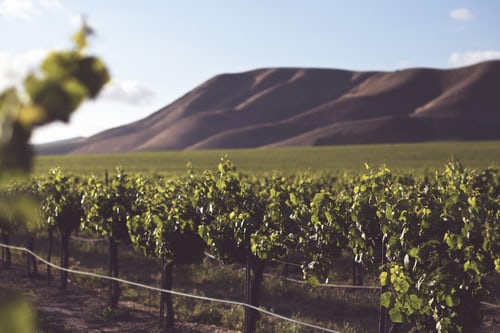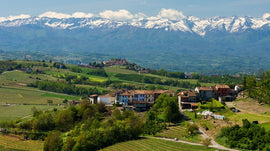Terroir is a tricky concept. A broad French term (‘sense of place’ is the most common translation) used to signal specificity (Randall Graham of Bonny Doon identifies it as “the precise opposite of nowhereness”), it is among the first wine words most of us learn, and one that remains central to our understanding of the subject. Most easily defined as the local environmental factors - climate, soil composition, vegetation, topography - that affect the flavor of a particular wine, what exactly constitutes terroir and whether or not it even matters is the source of considerable controversy amongst vintners and eonphilies alike. Maximalists assert that anything that goes into the production of the wine, winemaking technique included, counts as terroir, while others insist it is only the natural constants that qualify, leaving out variables like grapes, vintages and human intervention of any kind. For us, the debate itself illuminates how much the concept of terroir frames what we talk about when we talk about wine, and why we care so much in the first place. So this month we are featuring two winemakers whose efforts are excellent arguments for the continuing relevance of terroir: Chilean Pedro Parra, and Nicolas Mariotti Bindi of Corsica.
Pedro Parra has spent most of his life pondering the relationship between wine and terroir. Following an early career as a jazz musician, he attained an actual PhD in terroir from the Paris Center of Agriculture, and his work as a consultant for wineries on four continents has made him legendary for digging six feet deep soil pits (‘calicatas’) to help growers understand the below ground composition of their vineyards (hence the miner’s rock hammer on his wine labels.) In 2017, he realized a long-held dream and founded Pedro Parra Y Familia in the remote Itata Valley of his native Chile. About 500km south of Chile’s capital, Santiago, in the region of Bío Bío, Itata’s historical isolation from the rest of the Chilean wine industry provided a golden opportunity for Parra to put in practice his contention, derived from years studying French terroir, that geology is the key natural component in viticulture. “Rocks matter most”, in other words - and in Itata, that means 220-300 million year old, quartz laden granite soils, supporting some very old vines. More specifically, Pedro prizes the rare white granite compositions that he calls ‘chambolic’, which impart a characteristic minerality, elegance and finesse to the wines. The 2019 Imaginador is a vindication of his efforts; mostly composed of Cinsault, a southern French grape with Pinot Noir-like terroir sensitivity, it is beguiling blend of unique and familiar, a soft, slightly aromatic red with a mineral backbone and smoky overlay that will pair wonderfully with a slight chill and summer cuisine.
Like Pedro Parra, Nicolas Mariotta Bindi began his professional education in another field - initially moving to Paris to read law at the Sorbonne - before switching to wine, studying with some local masters, and eventually returning home to farm his native soil. Bindi is from Corsica, the fourth largest, and most mountainous, island in the Medditeranean. It was once ruled from Genoa before the French took over, in time for Napoleon Bonaparte to be born there a French citizen. But Corsica has always been a world of its own, with a viticultural tradition dating back thousands of years, and idiosyncratic microclimates that today comprise nine appellations. Bindi’s plots are in Patrimonio, on the northern coast, the oldest AOC in Corsica. Composed of mostly clay and limestone soils, there is enough internal variance within his fifteen hectares that Bindi divides his vines into four separate terroirs. Our selection this month is 100% Vermentinu (known as Rolle in France and, of course, Vermentino in Italy) from Bindi’s "Cantina di Torra'' label, which comes from a collection of 7.5 hectares of north-facing parcels called "Carcu." The vines were planted in 1970, 1996, and 2006 on clay and limestone and were recently converted to organic farming by Nicolas. It is a great example of specifically Corsican spin on a southern European grape, with a startlingly aromatic and lush nose leading to a classically structured, varietally correct and immensely satisfying palate.
Cheers,
The PlumpJack Wine Team
|
Pedro Parra “Imaginador” Cinsault 2019 |
|
|
Region / Country of Origin: Itata, Chile |
About the winemaker: Pedro Parra was born in Concepción, Chile, near Bio Bio and Itata, and he is raising his family there now. He holds a PhD in terroir from the Paris Center of Agriculture, with six years experience in French terroir. As a highly respected consultant working in several countries and terroirs, (Chile, Argentina, USA, Italy, Canada, France, Armenia), Pedro brings an open mind and vision to winemakers and viticulturists alike. Pedro has been described as the leading figure of the “New Chile”movement by the international press, in part because of his constant endeavors to bring a new vision to the Chilean wine industry, searching for quality terroir and developing new plantings throughout the country. About the winemaking: “IMAGINADOR” is a wine that was in Parra’s imagination many years ago, when he discovered the great potential of Itata’s terroir. This wine comes from four different growers, all in the upper part of the hills, over granite soils. All the sites were planted more than 200 years ago, with vines 45-70 years old. All blocks are supposed to be Cinsault, but because of the history they are all Cinsault field blends with Muscat, Semillon, Carignan and Pais. They are all harvested and vinified together. Aged in stainless steel and cement tanks for one year, then eight months elevage in bottle. 1300 cases produced. Tasting Notes: This beautiful Cinsault opens with floral and green leaf aromas that lead to a palate of silky red raspberry fruit, smoke and earthy notes. |
|
Winemaker: Pedro Parra |
|
|
$23 bottle /$248.4 case |
|
|
Suggested Food Pairing: Tomato and roasted corn salad Chimichurri Burgers Mesquite grilled chicken |
|
|
Nicolas Mariotti Bindi, Cantina Di Torra Bianco, Oleta 2018/19 |
|
|
Region / Country of Origin: Patrimonio, Corsica |
About the Winemaker: Originally from Bastia, in northern Corsica, Mariotti Bindi studied winemaking inMoulin-à-Vent in Beaujolais, and then with stages closer to home with Antoine Arena and Muriel Giudicelli before becoming head of viticulture at Domaine Leccia. He produced his first vintage in 2007. About the winemaking: For all his wines, harvest is manual and fermentation happens with natural yeasts. No additives, chemical herbicides or fertilizer are used. However, some sulfur may be added at bottling and filtration may be used if deemed necessary. In 2018, the Vermentinu was deemed so hot by Nicolas that he chose to hold it back on its fine lees in concrete for two years. He then blended it with the 2019 vintage which was much more of an even keeled harvest. Everything is harvested by hand in small baskets and once in the cellar, fermentations occur naturally and sulfur is used in limited doses. Tasting Notes: A generous nose of tropical fruit, honeydew melon and flower. Round, medium mouthfeel highlighted by pear and saline minerality. |
|
Winemaker: Nicolas Mariotti Bindi |
|
|
$27 bottle / $291.6 case |
|
|
Suggested Food Pairing: Roasted White meats Fresh Seafood Pasta with white sauce Crunchy greens Fried foods |
|





